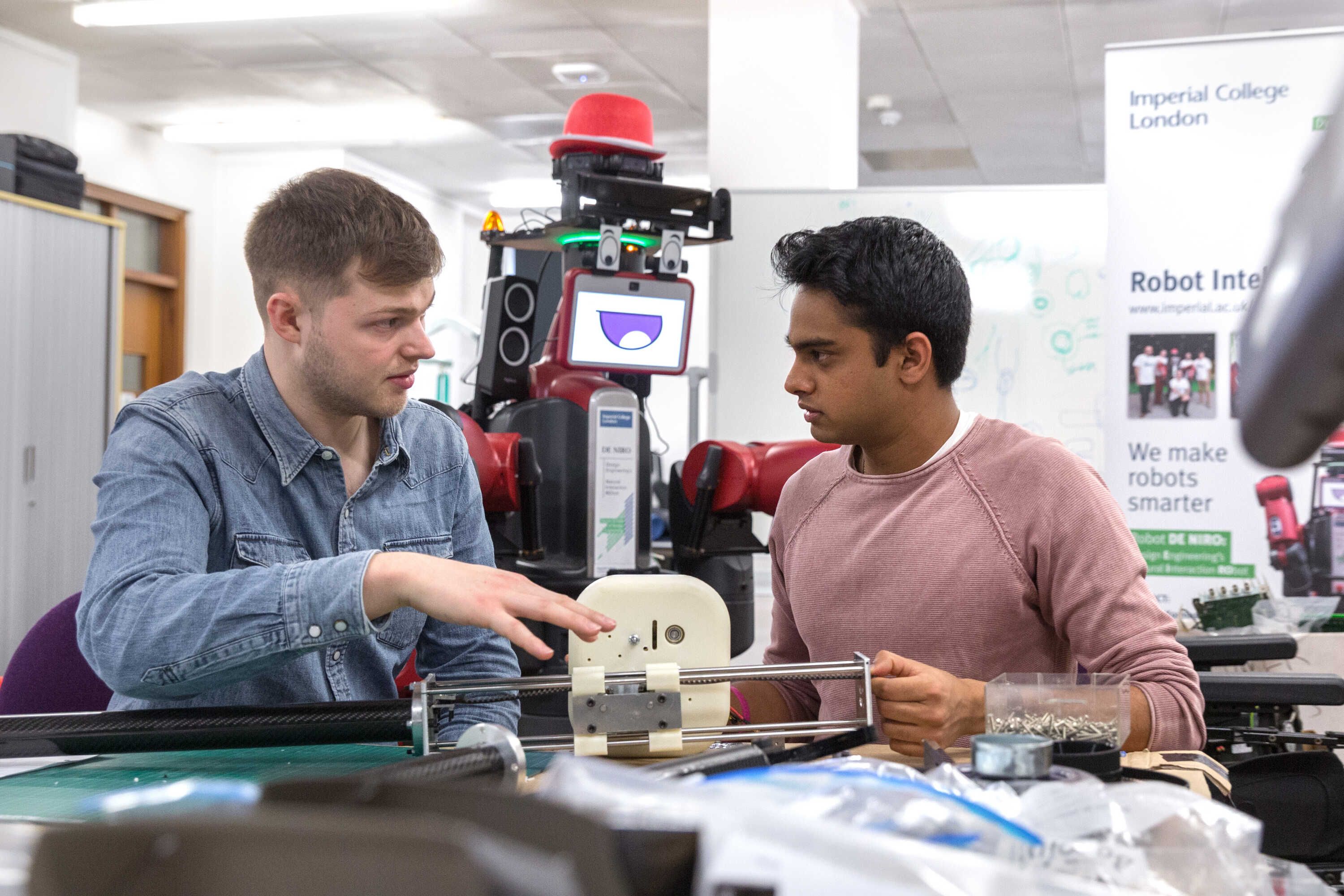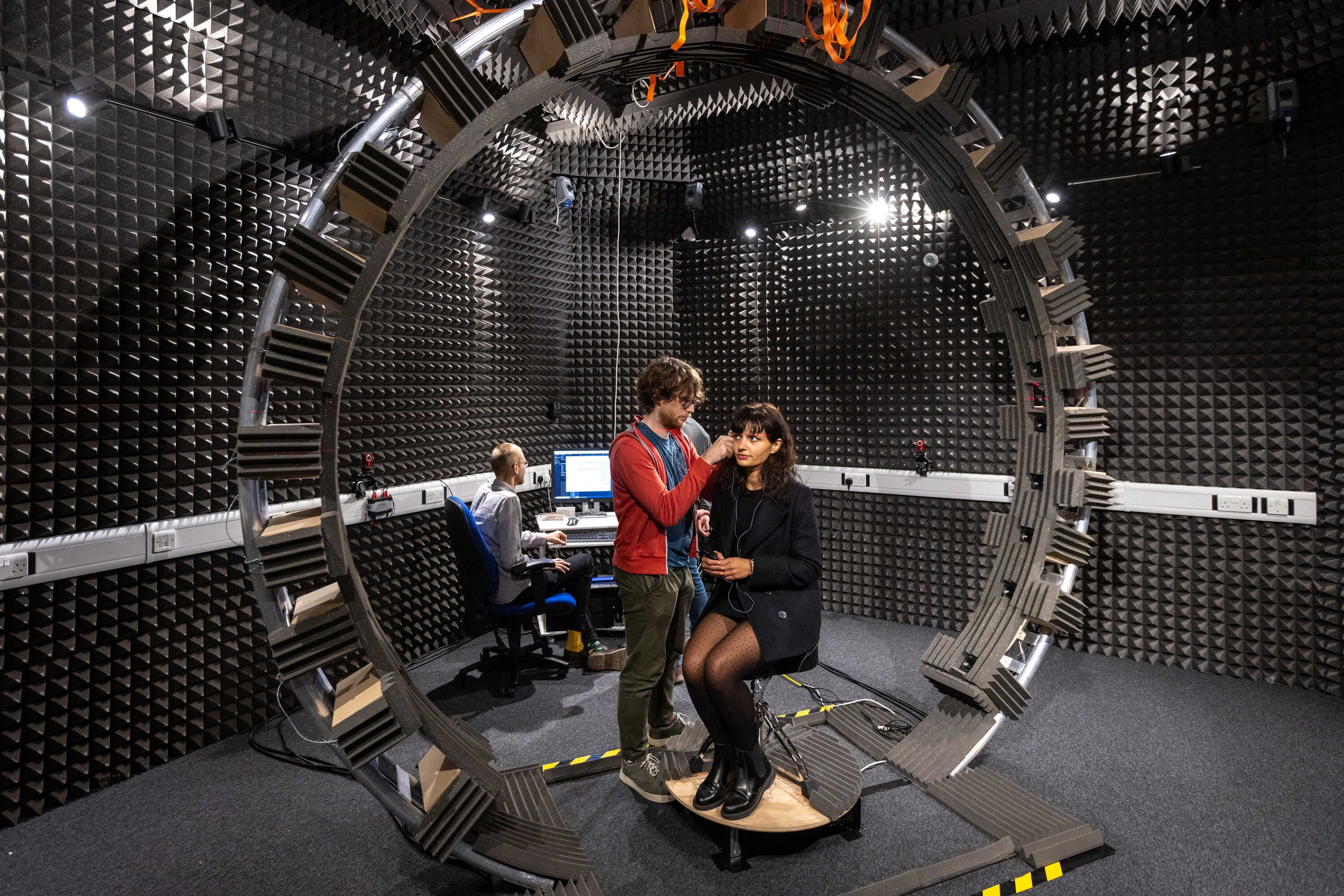
Design with Behaviour Science
Learn how to apply behavioural insights to the design of human-centred products and strategies.
Apply behavioural insights to the design of human-centred products and strategies.
Expand your STEM background with practical design skills aligned with industry needs.
Carry out an individual research project in an area of your interest.
Course key facts
Qualification
MSc
Duration
1 year
Start date
September 2025
Study mode
Full-time
-
Fees
£18,500 Home
£42,900 Overseas
Delivered by
Location
-
South Kensington
-
Minimum entry standard
First-Class Honours in a Science, Technology and Engineering discipline
Course overview
A transdisciplinary degree designed to equip STEM innovators with the skills and knowledge to design human-centred products and strategies.
You will develop a range of innovation and problem-solving skills by learning mixed methods that blend design approaches with behaviour science.
You will learn alongside people from a mix of science and engineering backgrounds to apply your knowledge to designing holistic solutions for humans in complex socio-technical systems.
An independent research project forms a substantial part of the degree, providing you an opportunity to develop practical skills in a subject area of your interest.
You will develop the ability to apply behavioural insights and design skills in a range of industries such as innovation roles in human-centred sectors (including healthcare, infrastructure, consumer products, and service design) and research roles (including digital, finance, government, and policy).
Structure
This page is updated regularly to reflect the latest version of the curriculum. However, this information is subject to change.
Find out more about potential course changes.
Please note: it may not always be possible to take specific combinations of modules due to timetabling conflicts. For confirmation, please check with the relevant department.
You will study seven core modules to introduce you to the key skills and methods of a designer, explore research methods and learn how to synthesise behavioural insights, scientific knowledge and design skills into impactful solutions.
Core Modules
This module will introduce the combined principles of behaviour science and design-led insights. Learn to apply these skills in an applied project, and will be encouraged to think critically about what problem is being solved, how, and for whom.
Understanding humans requires basic knowledge in psychology, and specifically those impacting behaviours in a given context. This module provides you with basic tools to consider human behaviour in the development of design solutions.
Deepen design engineering approaches, methods, and tools to develop innovative solutions for complex challenges. Master user and business needs evaluation, problem discovery, and generation of solution concepts for portfolios, competitions, and potential commercialization.
Learn and apply a wide range of research methods involving human subjects. Gain foundational knowledge of various data collection and analysis techniques and use them to tackle complex problems.
Research and apply state-of-the-art transdisciplinary mixed methods to address complex problems in fields such as health and sustainability. Learn advanced quantitative techniques, Natural Language Processing, and AI chatbot development to analyse stakeholder behaviours and human-human and human-AI interactions.
This module focuses on application of commonly used inferential statistics approaches for social and behavioural sciences. You will learn how to choose a suitable analysis for a given problem, as well as conduct appropriate reporting practices to confidently and correctly analyse results from experimental and observational test data.
In this module you will explore how to design for positive impact, and more preferable futures. You will gain an understanding of the tools and techniques available to implement sustainable design, reduce environmental impacts, and monitor the impacts of your interventions.
Testimonials
Teaching and assessment
Balance of teaching and learning
Key
- Taught modules
- Independent Study
- Specialist Events
Balance of assessment
- 31% Indipendent Study
- 52% Individual Project
- 17% Lectures and Practicals
Teaching and learning methods
-
Lectures
-
Tutorials
-
Presentations
-
Project based learning
-
Technology enhanced learning
-
Workshops and lab work
-
Team working
-
Industry collaboration
-
Independent study
Balance of assessment
Key
- Practical
- Coursework
- Exams
- 19% Practical
- 69% Course Work
- 13% Exams
Assessment methods
-
Demonstrations and exhibitions
-
Peer assessment
-
Online progress tests
-
Viva Voce
-
Project reports
-
Prototypes and Artefacts
-
Presentations
-
Written Examinations
Entry requirements
We consider all applicants on an individual basis, welcoming students from all over the world.
First-Class Honours in a Science, Technology and Engineering discipline (or a comparable qualification recognised by Imperial).
Footnotes
A 2:1 equivalent with more than 2 years professional experience or further studies in a related area may be considered.
How to apply
Apply online
You can submit one application form per year of entry. You can choose up to two courses.
Application deadlines – Round 3 closes on Thursday 15 May 2025
We operate a staged admissions process with several application rounds throughout the year.
Apply by 23.59 (UK time) on the closing date of an application round, to ensure you receive a response on your application by the relevant decision date.
Application rounds
Round 1
- Applications open on Friday 27 September 2024
- Applications close on Thursday 16 January 2025
- Decision by Thursday 6 March 2025
Round 2
- Applications open on Friday 17 January 2025
- Applications close on Thursday 27 March 2025
- Decision by Thursday 1 May 2025
Round 3
- Applications open on Friday 28 March 2025
- Applications close on Thursday 15 May 2025
- Decision by Thursday 17 July 2025
There is no application fee for MRes courses, Postgraduate Certificates, Postgraduate Diplomas, or courses such as PhDs and EngDs.
If you are applying for a taught Master’s course, you will need to pay an application fee before submitting your application.
The fee applies per application and not per course.
- £80 for all taught Master's applications, excluding those to the Imperial College Business School.
- £100 for all MSc applications to the Imperial College Business School.
- £150 for all MBA applications to the Imperial College Business School.
If you are facing financial hardship and are unable to pay the application fee, we encourage you to apply for our application fee waiver.
In addition to demonstrating you have met our entry requirements, we ask you to supply the following:
- Two references evidencing your analytical skills (e.g. academic references citing modules studied, and/or professional references citing applied examples in previous work experience).
- A personal written statement articulating your motivation and suitability for the degree.
Candidates who are shortlisted after this initial application will be invited to attend an interview with an Academic member of staff. This will normally be conducted remotely online.
An ATAS certificate is not required for students applying for this course.
Fees and funding
Home fee
2025 entry
£18,500
You should expect and budget for your fees to increase each year.
Your fee is based on the year you enter the College, not your year of study. This means that if you repeat a year or resume your studies after an interruption, your fees will only increase by the amount linked to inflation.
Find out more about our , including how inflationary increases are applied to your tuition fees in subsequent years of study.
Whether you pay the Home or Overseas fee depends on your fee status. This is assessed based on UK Government legislation and includes things like where you live and your nationality or residency status. Find out .
If you're a UK national, or EU national with settled or pre-settled status under the EU Settlement Scheme, you may be able to apply for a from the UK government, if you meet certain criteria.
The government has not yet published the loan amount for students starting courses in Autumn 2024. As a guide, the maximum value of the loan was £12,167 for courses starting on or after 1 August 2023.
The loan is not means-tested and you can choose whether to put it towards your tuition fees or living costs.
Scholarships
The Royal Commission for the Exhibition of 1851 Industrial Design Studentships
Value per award
- Full tuition fees plus stipend.
Who it's for
- UK resident, recently graduated first degree, and intending to make a career in British Industry.
Presidential scholarships for students of Black heritage
Value per award
- Home tuition fees up to £18,500, an annual maintenance grant of £21,000, and an allowance of £1,500 for equipment.
Who it's for
- Applicants of Black heritage
Master's Scholarship supporting disabled students
Value per award
- Tuition fees up to £18,500, maintenance grant of £21,000, and allowance of £1,500 for equipment.
Who it's for
- Disabled applicants
Sanctuary Scholarship – Postgraduate
Value per award
- Full tuition fees, £21,000 living costs, and £1,500 equipment grant
Who it's for
- Refugee applicants
How will studying at Imperial help my career?
Complement your technical and scientific skills with design and behaviour science to build a career in innovation, research, and development.
Become highly competitive across a range of sectors in established as well as emerging roles.
Develop the ability to understand, inform and monitor behavioural design interventions.
Learn to work with mixed methods and in multi-disciplinary teams to develop solutions to complex problems.
Work in sectors such as Healthcare, Consulting, Finance, Digital, Consumer Technology, Infrastructure, Service Design, and Government.
Further links
Contact the department
- T: +44 (0)20 7594 8888
- E: designeng-mscdwbs@imperial.ac.uk
Course Directors: Dr Nejra Van Zalk and Dr Leila Sheldrick.
Visit the Dyson School of Design Engineering website.

Request info
Find out more about studying at Imperial. Receive updates about life in our community, including event invites and download our latest Study guide.

Events, tasters and talks
Meet us and find out more about studying at Imperial.

Terms and conditions
There are some important pieces of information you should be aware of when applying to Imperial. These include key information about your tuition fees, funding, visas, accommodation and more.
You can find further information about your course, including degree classifications, regulations, progression and awards in the programme specification for your course.
Programme specifications




